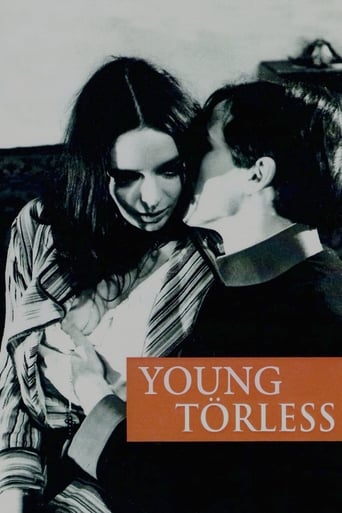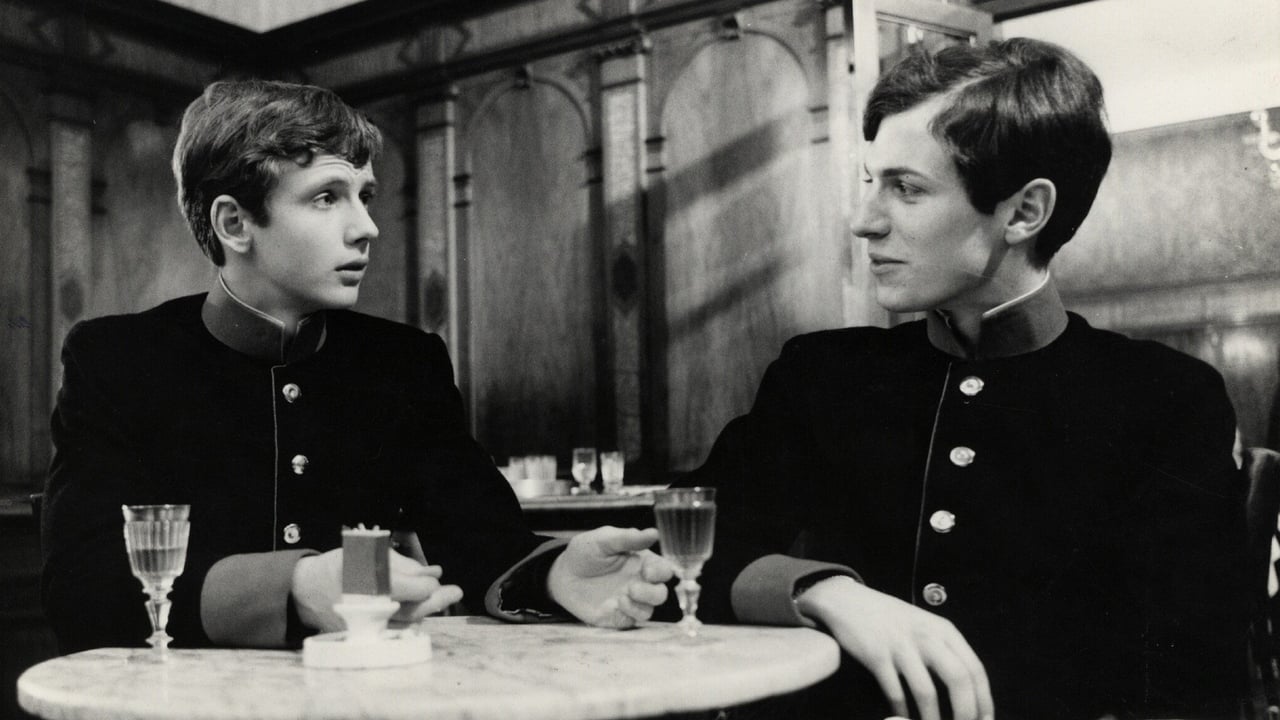markwood272
I selected this DVD off a library shelf at random. I had never heard of Young Torless. My idle curiosity was well rewarded. The film belongs in the same league with Loneliness of the Long Distance Runner, Zero for Conduct, Lord of the Flies, or other similar works. Perhaps there is allegory here, a foreshadowing of the murderous future of the Germanic peoples. Or maybe a nearer, smaller-scale atrocity: several scenes are as chilling as eavesdropping on a Leopold and Loeb strategy session.This is expertly crafted film making. Everything – casting, shot composition, editing, plot structure – works. Barbara Steele landed one of the great roles of her career. The music is especially effective. Hans Werner Henze's use of modern tonalities played on ancient instruments functions perfectly, achieving the film score ideal that complements the picture and other sounds, a Greek chorus without words. Aided by Henze's score, some of the scenes in Young Torless brought back with painful clarity many a sad, bleak, cloudy-morning memory of sophomore year in high school.
Jonny_Numb
By today's standards, a film like "Young Torless" may seem too coy and archly philosophical (and thus pretentious) a take on the corruption of youth, and the sources from which the corruption stems. Its strength, however, lies in the telling: when a student at a preparatory academy robs a peer to pay off a debt, he finds himself enslaved, both psychologically and sexually, by a gang of rogues looking to push him to the breaking point. In the midst of this is Torless (Matthieu Carriere), a student coming to terms with his identity in the midst of this moral dilemma, and whose mental landscape renders him a frustrated, conflicted character who runs the gamut from cold detachment to vague sympathy. While certain aspects of the film (the homosexual subplot, for instance) seem deliberately repressed due to the era, the implication is enough to give the events an additional potency. The black-and-white cinematography is excellent, capturing a specific atmosphere of dread and meditative solitude--German director Volker Schlondorff is not looking to titillate with sensationalist content, but instead spin a story of a young adult's struggle with the evils of an imperfect world. And on that level, "Young Torless" is one of the best films of its kind.
MartinHafer
The idea of writing a story about a boarding school where bullies humiliate and torture weaker classmates is interesting and well worth making into a film, so I was interested in seeing this German film. However, the main character, Törless, was so confusing and inconsistent that it really damaged the overall impact. During much of the film, this lad seemed to be almost sleepwalking through the film. Many times, he just stared or watched but said or did almost nothing. Then, other times, he unexpectedly participated in some of the humiliation of his classmate. And, at another time, he was totally disconnected and observed the beatings and humiliations like a cold and clinical character reminiscent of a character from a Camus novel. Then, towards the end he announced that the torment was wrong and he tried to get the young man who was being physically, emotionally and sexually abused to come forward. As a result of this exceptionally poorly written character, so much of the impact of the film is missing. This is definitely a case of "what might have been". Oh, and speaking of 'sexually abused', this whole VERY IMPORTANT part of the story is poorly handled--being vaguely alluded to and then minimized. I would think a person being raped and sodomized might be a bit deal, but in this film it didn't seem that way at all.
jan onderwater
Considered a classic film as it was the first film to put the then New German Film firmly on the (international) map. Also a classic because it was Schlöndorf's first feature and it is still thought highly of. To be sure, this is a beautiful film to watch with its superb black-and-white cinematography; Schlondörf's direction makes it into a well paced and staged, stylish film. But I never liked the film; recent re-viewing confirmed my feelings.Schlöndorf wants to do more than simply bring the viewer the subject and with that the whole thing goes wrong. In trying to convey the deeper meaning of the story as clear as possible the script is written in such way that even the most simple minded can not miss it. The film is lecturing without any subtleties; Schlöndorf never provokes the viewer to think for himself: he has already done it for him. Nor is there any nuance in the psychology of the different characters.And what about the cast? In 1966 (and still) praised for their effort as inexperienced actors. Well, I think that most of the acting is downright poor, or never goes further than reciting lines. In the meantime we have come to know Mathieu Carriere better during his career; Carriere is in this his first film as boring as he still is. Of course the actors were not helped much by the literary dialogue, another feature that was (and is) praised so much; most of it I find simply laughable. Classic miscast is Barbara Steele, who seems to have walked in from the set of a typical sexploitation film, including acting style.


 AD
AD



